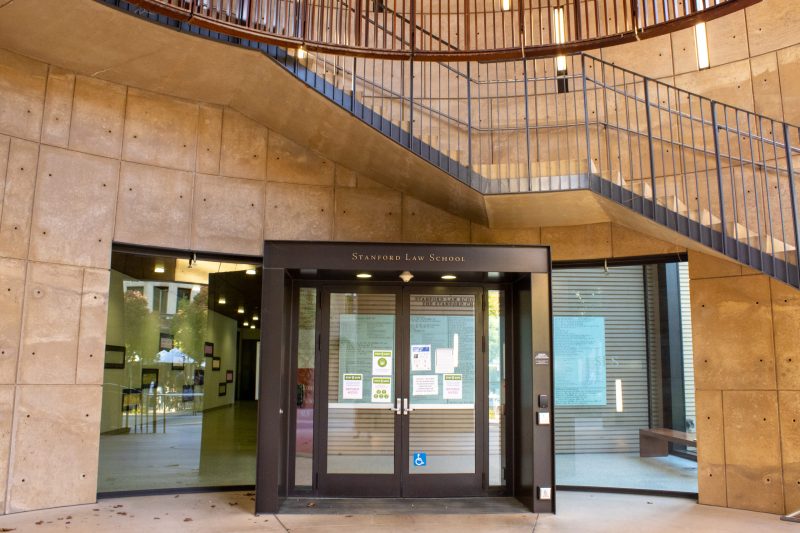Former president Donald Trump was criminally charged on 34 felony counts Tuesday, marking the first time in U.S. history a former president has faced criminal charges.
A grand jury based in Manhattan charged Trump — who has already announced his candidacy for the 2024 presidential election — with 34 counts of first degree falsification of business records. The charges follow years of investigations into the former president’s real estate practices and alleged payments made to silence adult actress Stormy Daniels over a purported extramarital affair between the two.
Stanford Law professors expressed differing views on the legitimacy of the criminal charges against Trump and noted the politically charged atmosphere surrounding them.
According to Hoover Institution Senior Fellow and Constitutional Law Center Director Michael McConnell, the charges erode public confidence in the criminal justice system. He specifically addressed the matter of Trump being both a former president and an actively campaigning candidate, saying that “from a view of democratic norms, [the prosecution] is highly distasteful.”
“[T]he danger is that people are using the criminal justice system as an instrument of political vengeance rather than for justice,” McConnell said. “They ought to look very carefully at [the charges] and make sure that it’s something that can stand up to objective examination that isn’t just something that will be cheered on by the leaders [and] detractors.”
McConnell’s concerns around the political nature of the case were not shared by some of his colleagues. Robert Weisberg J.D. ’79, a faculty co-director of the Stanford Criminal Justice Center (SCJC), doesn’t believe that the charges against Trump were directly due to politics.
“All I can say is that the argument [asserting political overreach] is there, but it [has] not dissuaded the district attorney, therefore it just wasn’t an important factor in his mind,” Weisberg said.
Weisberg added that while Trump being a former president and a declared candidate for the 2024 presidential election is unprecedented, his uniquely situated political presence is “not a legal factor that immunizes you from prosecution.”
At Trump’s arraignment on Tuesday, no gag order was requested. However, taking into account the national interest in the case and the concern that it could become more charged as a political matter, legal experts have speculated that a gag order — a motion that a judge can impose to restrict what those involved in a case are able to say beyond the courtroom — might eventually be enacted to prevent both sides from publicly commenting on the case as it unfolds.
Stanford Law Professor and former federal prosecutor George Fisher said that the potential value of a gag order in this case is rooted in shielding potential jurors from potentially biasing statements.
“That’s especially true when there’s a risk that lawyers will [publicly] reveal facts about the case that aren’t yet publicly well known, especially facts that might push jurors in one way or another and bias them,” Fisher said.
McConnell said that these considerations around publicity are typically not the norm in criminal proceedings as most criminal defendants already prefer a trial out of the public eye.
Weisberg said of Trump that “[he] is the most visible person in the world.”
While the public eye would be especially focused on the proceedings, the additional factor — unique to a defendant such as Trump — of constant Secret Service protection, Weisberg said, also means that “there is no worry that [Trump] will flee.”
Media access has also been hotly debated surrounding Trump’s trial, Weisberg said. “The press will say that they have a First Amendment right to observe and learn about what’s going on in the proceedings. That’s another fine line to draw. A judge, at least for a certain period of time, can restrict press access.”
Politicians, including Trump himself, have already shared their opinions on the case. After pleading not guilty on all counts, Trump stated in his first public remarks since his court appearance that “the only crime I’ve committed is to fearlessly defend our nation from those who seek to destroy it.”
Meanwhile, Senator Josh Hawley ’02 (R-Miss.) tweeted “this case against Trump has nothing to do with the law. It’s an assault on the rule of law.”
Congressman Adam Schiff ’82 (D-Calif.), who led the charges against Trump during his first impeachment trial, released a statement on the grand jury’s decision to criminally charge the former president, stressing the importance that “while unprecedented, it is also deeply and fundamentally necessary to preserve the rule of law.”
“If we are to be a nation of laws, then we must apply the law equally and to everyone, regardless of their station,” the statement read. “To do otherwise, because holding a president accountable is controversial or provocative, will not bring order, but breed disorder, and disrespect of the law.”
